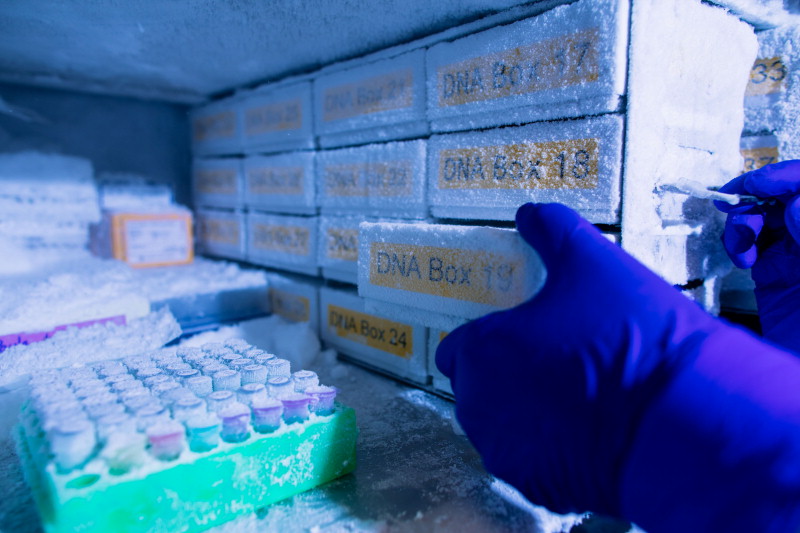-
Cancer
6 ways individualized medicine is advancing patient care

ROCHESTER, Minn. — Individualized medicine is tapping the human genome in new ways to attack health care disorders, predict risk of disease, make an earlier diagnosis and identify precise therapies. Individualized medicine, also called precision medicine, uses people's information about their genetic blueprints, lifestyles and environments to shape health care.
On Wednesday, Sept. 12, Keith Stewart, M.B., Ch.B., Carlson and Nelson Endowed Director, Mayo Clinic Center for Individualized Medicine, presented six ways precision medicine has further advanced into patient care over the past year. Dr. Stewart shared these innovations today in his opening welcome to the 2018 "Individualizing Medicine Conference: Advancing Care Through Genomics" in Rochester.
“In the 15 years since the first human genome was mapped, hundreds of thousands of patients have had their DNA sequenced, which has helped pinpoint the cause of disease and respond with individualized treatment,” says Dr. Stewart. “Fifteen years is a very short time in the history of medicine, and there’s still a lot we don’t know. Our research is helping us understand this emerging area of health care and its application to clinical practice. This conference is a great platform for sharing those discoveries.”
Dr. Stewart points to six key ways individualized medicine has advanced patient care over the past year:
1. Genomic testing is moving beyond disease to benefit healthy patients.
The cost of genomic sequencing has dropped sharply, making it possible to consider making DNA sequencing more widely available as a regular, pre-emptive clinical test for most patients. Mayo Clinic is conducting research to learn whether genetic testing of healthy patients might be as useful as a cholesterol test or regular cancer screening.
“We are interested in learning how we can use these tests to predict disease risk and intervene earlier. Further, we are exploring how genetic test results can be entered into the electronic health record in meaningful ways and studying how to improve care without increasing cost,” says Dr. Stewart.
2. Genetic testing is uncovering more hereditary links to cancer.
Research is finding that genetic testing is ushering in a new era of cancer prevention and treatment. DNA tests are identifying inherited genetic mutations ─ even in patients without a strong family history of cancer. A finding of hereditary cancer can influence cancer treatment and alert family members that they, too, should be screened to learn their risk for cancer. Investigators and physicians at Mayo Clinic are recommending expanding genetic testing as a cancer screening tool for all or nearly all cancer patients.
3. Research is advancing DNA blood tests to find and track the course of cancer.
Mayo Clinic has made great strides in developing DNA blood tests, known as liquid biopsies, that can detect the presence of cancer, monitor response to treatment and track recurrence before a tumor appears or returns. The test searches for DNA from cancer cells circulating in the bloodstream. Such blood tests may offer alternatives to X-rays and tissue biopsies, and may have the power to find cancer at an early stage when it is most curable.
4. Genetically engineered cells that act as living drugs are a new option in cancer care.
Chimeric antigen receptor T-cell (CAR T-cell) therapy seeks to harness the power of each patient’s individual immune system by genetically modifying cells, equipping them with power to kill cancer. These engineered cells multiply and act like a living drug that uses the body’s defense system to fight disease.
5. Artificial intelligence, also known as augmented human intelligence, is being tapped for individualized diagnosis and treatments.
Artificial intelligence, or augmented human intelligence, combines physician know-how with deep computer analysis to recognize patterns and trends that could lead to an early diagnosis. Machine learning could help radiologists by automatically processing thousands of images generated during an exam and identifying which images may be related to health and disease. Mayo Clinic also is studying ways augmented human intelligence can identify individualized therapies for breast cancer, depression and Alzheimer’s disease.
6. Drug-gene testing is more widely available.
Pharmacogenomics is the area of precision medicine that examines how a person’s genetic makeup influences how the body processes and responds to medications. Mayo Clinic is pre-emptively entering pharmacogenomics test results of more than 11,000 patients into the electronic health record to study how having this information could guide prescribers to safer and more effective medications. This is another step toward making pharmacogenomics testing available for more patients and health conditions.
Dr. Stewart is the Vasek and Anna Maria Polak Professor of Cancer Research Division of Hematology-Oncology, Mayo Clinic.
###
About Center for Individualized Medicine
Mayo Clinic Center for Individualized Medicine discovers, translates and applies new findings in genomic research into individualized medicine products and services for patients everywhere. Learn more on the Mayo Clinic Center for Individualized Medicine website.
About Mayo Clinic
Mayo Clinic is a nonprofit organization committed to clinical practice, education and research, providing expert, comprehensive care to everyone who needs healing. Learn more about Mayo Clinic. Visit the Mayo Clinic News Network.
Media Contact:
- Susan Buckles, Mayo Clinic Public Affairs, 507-284-5005, newsbureau@mayo.edu







